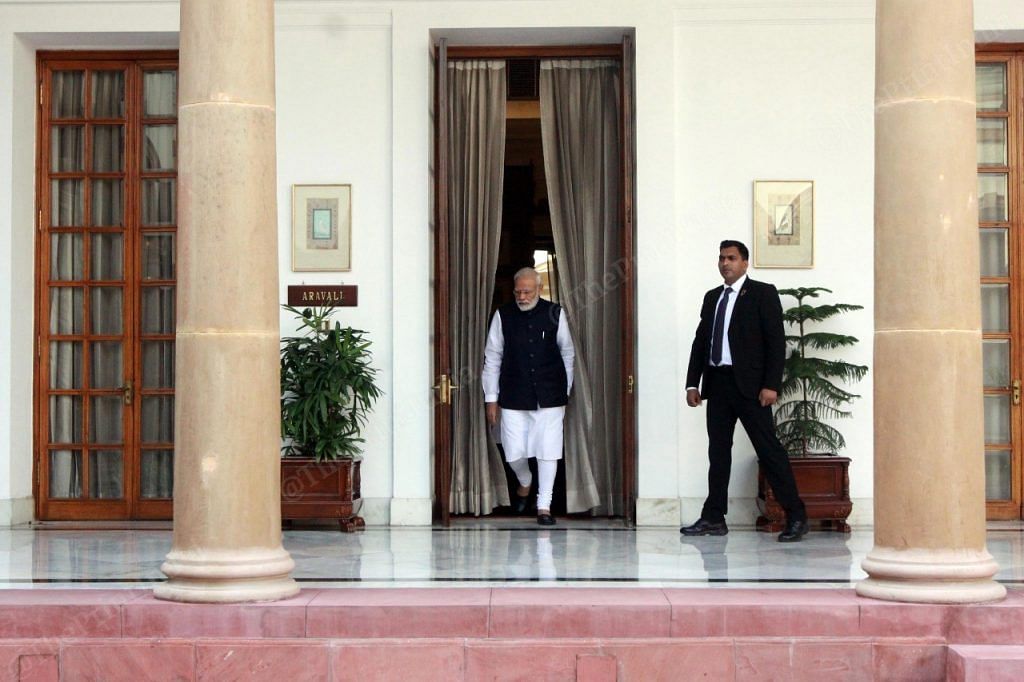Prime Minister Narendra Modi has had a lot thrown at him this week. Days after losing Maharashtra, NCP leader Sharad Pawar accused Modi of offering his daughter, Baramati MP Supriya Sule, a post in the Union government in exchange for supporting the Devendra Fadnavis government – Pawar said he turned down the offer.
More serious have been the accusations against Modi for mishandling the economy. Modi’s predecessor, Manmohan Singh, as well as ex-finance minister P. Chidambaram, have charged the PM with “catastrophic mistakes like demonetisation, flawed GST, tax terrorism, regulatory overkill, protectionism and centralised control of decision-making in the PMO.”
None other than the RBI has weighed in by slashing growth forecasts to 5 per cent, the ‘deepest cut in a decade’.
Also read: As India becomes de facto Hindu Rashtra, BJP looks for new ways to polarise voters
But Modi shows no signs of being perturbed – although Home minister Amit Shah, not Agriculture Minister Narendra Singh Tomar held a meeting on rising onion prices – or letting up on divide-and-rule.
His cabinet has just cleared the Citizenship (Amendment) Bill or CAB, which aims at granting Indian citizenship to non-Muslim illegal immigrants from Bangladesh, Afghanistan and Pakistan. The Bill will be introduced during the ongoing winter session of Parliament.
This means that only Hindus and Sikhs and Buddhists can get Indian citizenship, if they wish. Only Muslims, even if they are seeking asylum in India, will be turned away. With this Citizenship Bill, Modi is shutting the door to Muslims persecuted in their own countries – they can go elsewhere, but they can’t come to India.
Also read: Rahul Gandhi spells out Congress stance on citizenship bill, but opposition remains divided
What does this do to Modi’s South Asia policy? Officials shrug their shoulders and say no one in the neighbourhood can point a finger at Modi’s India, because they are hardly the upholders of equal rights in their own nations.
For example, Sri Lanka is still contemplating rights for ethnic Tamils, Bangladesh’s Hindu minority is dwindling, Nepal doesn’t count because its citizens are already allowed to work and buy property in India, Bhutan and the Maldives have a much higher per capita income, and Afghanistan hardly matters.
The point here is that the idea of India as a refuge, of a country that doesn’t turn away the dispossessed, the disinherited and the castaway, is now changing. Over centuries and across empires, India has absorbed foreigners and made them her own. After the Citizenship (Amendment) Bill, only those foreigners who are not Muslims, can apply.
Modi remains unmoved by the criticism. He has the numbers. In a democracy, he perhaps believes, it’s the only thing that counts.
On the CAB, therefore, the BJP is home and dry (303/543) in the Lok Sabha. But even in the Rajya Sabha it appears confident, although technically the NDA, with 102 MPs, doesn’t have a majority in the 250-member House – at the moment down to 238, which means that 119 is the half-way mark. But the BJP is confident that it will additionally get the support of allies like the AIADMK (11), Biju Janata Dal (7), Telangana Rashtra Samithi (6) and others and get the bill passed.
Also read: As India becomes de facto Hindu Rashtra, BJP looks for new ways to polarise voters
In Modi’s council of ministers, there is only one Muslim, Mukhtar Abbas Naqvi, responsible for minority affairs, two Sikhs – Harsimrat Badal of the Akali Dal and Hardeep Singh Puri of the BJP –, and one Parsi by marriage, Smriti Zubin Irani.
But it seems now that the removal of Muslims from the highest elected office is being extended to Christians.
It seems that the Modi government is mulling the introduction of constitutional amendments that will dilute or remove Articles 333 and 334, which nominate two Anglo-Indians to the Lok Sabha (and bring the 543 elected MPs to 545). Alongside, the nominated Anglo-Indian MLAs in 10 state assemblies will also go.
Perhaps Modi won’t go so far. India’s Anglo-Indians hardly count for much – numerically. But they matter.
Certainly, Modi has changed India in his image in the six years he has been in power. The lesson of Maharashtra, which the opposition hopes to bring to the Jharkhand and Delhi assembly elections, is that the only way to fight back is to unite against the BJP juggernaut.
For now, though, Narendra Modi remains the tallest leader across the political spectrum. As 2019 draws to a close, he remains difficult to dislodge.
